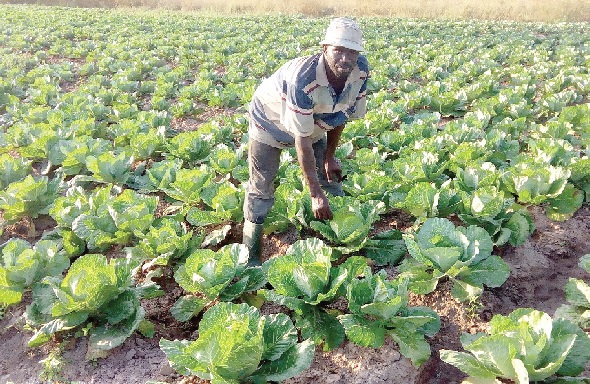Despite a significant boost in funding to the Metropolitan, Municipal and District Assemblies through the District Assemblies Common Fund, the agriculture sector— a key driver of the economy and employing over 50 per cent of the population—has been neglected, with no direct allocation from the GH¢987.96 million first-quarter 2025 disbursement, a Graphic Business analysis has found.
This means that agricultural initiatives such as the Ghana Commercial Agriculture Project are helping smallholder farms increase their productivity, and the Savannah Agricultural Value Chain Development Programme, which is working to expand the production of key crops like maize, soybean, and rice, will face challenges.
Additionally, the Inland Valley Rice Development Project, which focuses on developing rice production in inland valleys, providing infrastructure support and improved inputs, and the Youth in Agriculture Programme, which is designed to attract the youth into agriculture, will also be hard hit due to low funding.
This is because the disbursements to the MMDAs were allocated to specific projects. The projects include: 25 per cent for model markets, 10 per cent each for health infrastructure, educational infrastructure, school furniture, and water and sanitation projects, plus 20 per cent for completing abandoned legacy projects.
This represents a notable improvement from 2017-2024, when only 40-50 per cent of DACF allocations reached the assemblies, leaving local governments under-resourced.
Funding gap
The funding gap has prompted urgent calls for policy reform, with experts warning that systematic underfunding of agriculture at the local level jeopardises Ghana’s food security and rural development goals.
An agribusiness and investment strategist, Raymond Denteh, told the Graphic Business that the District Assemblies Common Fund’s lack of direct funding for agriculture was a significant misalignment between national development goals and local government planning in a country where over half the population depends on farming.
He said the district-level Ministry of Food and Agriculture (MoFA) offices remained severely under-resourced, with extension officers lacking basic tools, mobility and digital infrastructure, while they maintained unacceptably high officer-to-farmer ratios that limited their effectiveness.
Key recommendations
He explained that the lack of DACF allocation to agriculture could hinder its growth at the local level in Ghana. However, he stated that district assemblies should adopt several innovative and strategic approaches to maintain service delivery and promote local economic development.
Mr Denteh made several key recommendations, including diversifying and strengthening Internally Generated Funds (IGF) by improving collection systems for property rates, market tolls, and business permits through digitisation, with a portion allocated explicitly for agricultural development and extension services.
He further advocated the establishment of agricultural land banks in collaboration with traditional authorities to attract investors and facilitate land access for youth and agripreneurs, while leveraging strategic partnerships with Non-Governmental Organisations (NGOs), Civil Society Organisations (CSOs), and donor-funded projects for co-financing opportunities.
Furthermore, he suggested expanding support for Village Savings and Loans Associations (VSLAs) via Social Welfare and Community Development departments to enhance grassroots financial inclusion and serve as platforms for microenterprise growth, especially benefiting women and youth in rural areas.
Efficient resource utilisation
Meanwhile, in a separate interview, the former General Secretary of the General Agricultural Workers Union (GAWU), Edward Kareweh argued that effectively using allocated resources was more important for transforming Ghana’s agricultural sector than a significant budget increase.
"While it is desirable to allocate more resources to agriculture, we must remember that the key to advancing agriculture is ensuring the efficient use of resources within the sector,” he stated.
He cited the Planting for Food and Jobs programme as an example, explaining that although over GH¢5 billion had been invested, the country had little to show for it due to the imprudent use of resources.
He identified significant weaknesses in the implementation of agricultural policies that needed to be addressed to ensure the success of new initiatives.
He said allocated funds in the budget were often not fully disbursed at the end of the day, creating a gap between planned and actual spending. He said that where disbursements were made, the money did not always reach the target beneficiaries, with funds sometimes diverted for other purposes or inputs smuggled out of the country.
Additionally, he said that even when resources reached farmers, there was no guarantee they would be used as intended, with some farmers selling fertilisers meant for their farms or using less than the recommended quantities.
“You need to trace the value chain of the supply to ensure that at every stage, the things are properly done the way you want it to be done,” he advised, stressing the critical role of agriculture in the country’s economic development, particularly in light of the government’s 24-hour economy policy.
“Agriculture is the mainstay of the economy. It produces food for us to feed on. It also produces the raw materials for most of our industries,” he stated, adding that the 24-hour economy, which seeks to increase manufacturing and productivity, would require raw materials that must come from the agricultural sector.
“I would strongly suggest that we should get agriculture to get back to its glory days, to serve as the foundation to produce enough foodstuff for this country and, at the same time, raw materials for our industries,” Mr Kareweh said.
